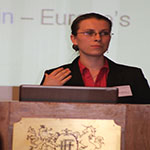Euroacademia Conferences
 Europe Inside-Out: Europe and Europeanness Exposed to Plural Observers (9th Edition) April 24 - 25, 2020
Europe Inside-Out: Europe and Europeanness Exposed to Plural Observers (9th Edition) April 24 - 25, 2020 Identities and Identifications: Politicized Uses of Collective Identities (9th Edition) June 12 - 13, 2020
Identities and Identifications: Politicized Uses of Collective Identities (9th Edition) June 12 - 13, 2020 8th Forum of Critical Studies: Asking Big Questions Again January 24 - 25, 2020
8th Forum of Critical Studies: Asking Big Questions Again January 24 - 25, 2020 Re-Inventing Eastern Europe (7th Edition) December 13 - 14, 2019
Re-Inventing Eastern Europe (7th Edition) December 13 - 14, 2019 The European Union and the Politicization of Europe (8th Edition) October 25 - 26, 2019
The European Union and the Politicization of Europe (8th Edition) October 25 - 26, 2019 Identities and Identifications: Politicized Uses of Collective Identities (8th Edition) June 28 - 29, 2019
Identities and Identifications: Politicized Uses of Collective Identities (8th Edition) June 28 - 29, 2019 The European Union and the Politicization of Europe (7th Edition) January 25 - 26, 2019
The European Union and the Politicization of Europe (7th Edition) January 25 - 26, 2019 7th Forum of Critical Studies: Asking Big Questions Again November 23 - 24, 2018
7th Forum of Critical Studies: Asking Big Questions Again November 23 - 24, 2018 Europe Inside-Out: Europe and Europeanness Exposed to Plural Observers (8th Edition) September 28 - 30, 2018
Europe Inside-Out: Europe and Europeanness Exposed to Plural Observers (8th Edition) September 28 - 30, 2018 Identities and Identifications: Politicized Uses of Collective Identities (7th Edition) June 14 - 15, 2018
Identities and Identifications: Politicized Uses of Collective Identities (7th Edition) June 14 - 15, 2018
Turn the Other Greek. How the Eurozone Crisis Changes the Media Image of Greeks and What do the Visual Representations of Greeks Tell Us About European Identity?
-
-

-
Presentation speakers
- Daniela Chalaniova, Metropolitan University, Prague, Czech Republic
- Download presentation
Abstract:
This paper analyzes discursive practices of political cartoons in construction of Greek and European identity in light of the European sovereign debt crisis. The goal of this paper is to assess the emergence of Greeks as significant Others in relation to Europe and its impact on European identity. To this end, the paper develops a theoretico-methodological framework that brings together identity as a process and a project, and multimodal discourse analysis tailored to political cartoon research. The paper first tests for existence of a Europe-wide discourse of the crisis and Greeks, using qualitative methodology. After existence of such discourse is confirmed, the paper examines the contents of the discourse concluding that a Greek Other has emerged from the discourse and continues to search for common interpretive frames and shared meanings that would point towards a common European identity. The political cartoon data sample comes from these examined countries: Austria, France, United Kingdom and Slovakia.
-
Related Presentations

“Who Could Challenge Democracy? ” The Law on Religious Freedom - An Expression of Romanian Democracy?
- Natalia Vlas

Czech Modernity As Secular Modernity
- Roman Vido
















